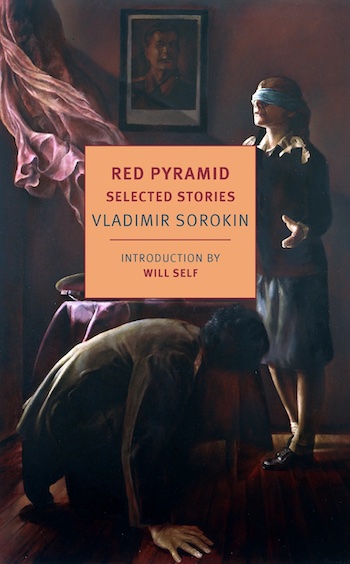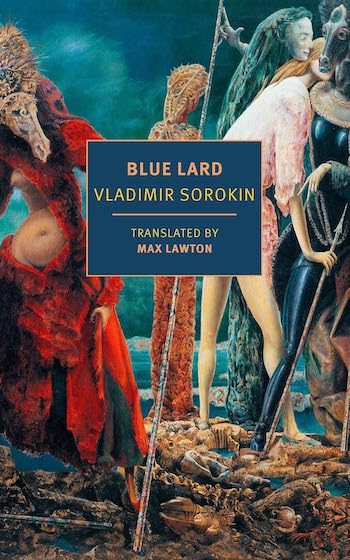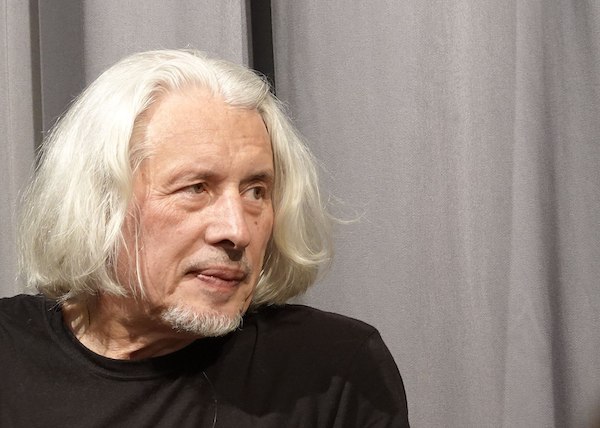Book Review: More Hilarious Satiric Depravity From Vladimir Sorokin — The Tsars My Destination
By Peter Keough
Russian satirist Vladimir Sorokin’s excremental vision triumphs in two new translations.
Blue Lard by Vladimir Sorokin. Translated by Max Lawton. New York Review Books. 368 pages. $18.95.
Red Pyramid by Vladimir Sorokin. Translated by Max Lawton. New York Review Books. 320 pages. $18.95.

Vladimir Sorokin might be a devout Russian Orthodox believer but he has a dirty, twisted mind. He’s been spinning his daft, Boschian perversities since the Brezhnev era, as can be seen in two new volumes from New York Review Books — Red Pyramid, a dazzling and disgusting collection of stories published from 1981 to 2018, and the 1999 novel Blue Lard, an epic of sublime and hilarious depravity.
The latter combines the inventiveness of Thomas Pynchon, the formal and verbal disruptiveness of James Joyce, and a transgressive, excremental vision that rivals the Marquis de Sade and Jonathan Swift. When it was first published, Russian authorities felt compelled to charge him with being a pornographer (the case was dismissed); better than that, a Putinesque mob of hooligans was inspired to toss copies of the novel into a giant toilet in Red Square.
That was over 20 years ago. These days Sorokin lives in self-imposed exile in Berlin and has been since the Russian invasion of Ukraine. But his subversiveness had been evident as far back as the first story in Red Pyramid, “Passing Through,” written in 1981. It follows an oft-repeated pattern: a bureaucratic meeting headed by a sadistic functionary culminates with an outrage. Here a bullying visiting inspector follows up a factory staff meeting by paying a visit to the chief of the propaganda department. After some breezy small talk he drops his pants and takes a dump on the party hack’s prize creation — a mock-up of the factory’s 50th-anniversary album. A crude but effective statement on the state of then-Soviet governance, society, and literature.
In “A Hard-Nosed Proposition” — published the same year, a prickly newspaper editorial meeting ends with a gay lovers’ tiff resolved via a gruesome make-up present. Shit proves to be the gift that keeps on giving in 1986’s “Obelisk,” in which an old babushka and her daughter pay a visit to a war memorial commemorating the battle in which her husband was killed during World War II. They pay tribute to the old man by reassuring him that the hallowed family practice of the daughter sucking excrement out of her mother’s anus continues, and then some.
Coprophagy gives way to cannibalism when it comes to hollowed tradition in “Nastya” — published in 2000. Set in 1899 at the dacha of a provincial aristocrat, it opens with the diary pages of a girl describing her excitement and trepidation at turning 16 when an unspecified rite of passage is to take place. Her uneasiness is justified. It proves to be an obscene feast described with increasingly gruesome detail. Perhaps even more horrifying is the genial conversation that accompanies it — gossip, patriarchal blusterings, a philosophical argument about Nietzsche. Not to mention the subsequent debaucheries and atrocities of the participants.
One wonders how “Nastya” escaped the condemnation of Putin’s proxy thought police until 2017. Perhaps such stories got away with their abominations because they were set in the past, the future, or in alternative histories. These are devices Sorokin would employ in novels such as Day of the Oprichnik (2006), Telluria (2016) and the Ice trilogy (2002-2006). “A Month in Dachau” (1990), for example, takes place in a world in which the Third Reich and Soviet Union had banded together to defeat the Allies — it is kind of like Philip K. Dick’s 1962 novel The Man in the High Castle — devolving into an obscene, sado-masochistic phantasmagoria.
 Given its counterfactual dystopia, “A Month in Dachau” is a precursor of Blue Lard, which opens in 2068 — in a laboratory in Siberia where Russian scientists are working on a top secret project. The goal was to clone the great writers of Russian literature; the experiment has fallen far short of success. The final candidates are Tolstoy-4, Chekhov-3, Nabokov-7, Pasternak-1, Dostoevsky-2, Akhmatova-2, and Platonov-3 (the numbers refer to the cloning attempts). However, on the plus side, the effort has produced a mysterious by-product. When prodded to write, these petri dish monstrosities ended up churning out grotesque parodies of their work (they all tend to degenerate into Sorokin’s own fragmented and scatological style). But the process also somehow stimulated their bodies to grow pockets of the glowing cerulean oleo of the title, a substance with physics-defying properties that can be harvested for purposes yet unknown.
Given its counterfactual dystopia, “A Month in Dachau” is a precursor of Blue Lard, which opens in 2068 — in a laboratory in Siberia where Russian scientists are working on a top secret project. The goal was to clone the great writers of Russian literature; the experiment has fallen far short of success. The final candidates are Tolstoy-4, Chekhov-3, Nabokov-7, Pasternak-1, Dostoevsky-2, Akhmatova-2, and Platonov-3 (the numbers refer to the cloning attempts). However, on the plus side, the effort has produced a mysterious by-product. When prodded to write, these petri dish monstrosities ended up churning out grotesque parodies of their work (they all tend to degenerate into Sorokin’s own fragmented and scatological style). But the process also somehow stimulated their bodies to grow pockets of the glowing cerulean oleo of the title, a substance with physics-defying properties that can be harvested for purposes yet unknown.
Among other things, this is a savage satire of contemporary Russian culture that is matched later in the book by a version of the opera Eugene Onegin performed at the Bolshoi Theater — filled, for the event, with the contents of the Moscow sewage system (patrons and performers wear scuba equipment). And a prefiguration, perhaps, of the toilet protest against Blue Lard itself.
This part of the book is related in letters from one of the scientists, Boris Gloger, to his lover back in Moscow. They are written in a bastardized patois reminiscent of the nadsat language of Anthony Burgess’s 1962 novel A Clockwork Orange — in this case a fusion of Russian, Chinese, and a post-apocalyptic hipster argot (congratulations to translator Max Lawton for rendering it into rapturous if not always comprehensible English). It begins:
“Hello, mon petit.
“My heavy little boy, my tender bastard, my divine and vile top direct. Remembering you—such infernal business, rips laowai—is heavy in the strictest sense of the term.
“And dangerous too: for sleep, for L-harmony, for the protoplasm, for the skandhas, for my V-2…”
A glossary is provided in the back of the book, though its usefulness is limited. As Lawton himself notes in his “Extroduction:” “not even Vladimir knows what the ample neologisms that pepper the epistolary section mean, the book’s glossary offering no definition of any real utility.”
As ingenious as this section may be, some readers might be relieved when, in a stroke of characteristic narrative disruption, the lard changes hands and we enter the world of the “Russian Earthfuckers,” an extreme Luddite band of fundamentalist believers who honor the frozen tundra by having intercourse with it. The lard then passes through a dizzying array of trapdoors, secret passages, and spiraling chutes and concatenating ladders into various levels of the Earthfuckers’ domain – it is a kind of Alice in Wonderland except Wonderland is really Hell and there is no Alice. Its structure mirrors that of the novel, which is multitiered and circular, and also reflects a theory broached later in the book which describes time as a cabbage, with its infinite leaves the events of the universe. Aphids infect and eat through these leaves, linking them in arbitrary ways.

Vladimir Sorokin in Zurich in 2022. A merciless satirist with a dirty, twisted mind. Photo: Wiki Common
That, at any rate, is how the Russian physicist Andrei Sakhorov describes it in the alt-historical year of 1954 when he is called on to explain the sudden appearance of a time machine containing the lard sent by the perhaps not-so-Luddite Earthfuckers. Sakharov had achieved renown previously by inventing the atomic bomb, which had been used to nuke London and so win victory for the Nazi-Soviet alliance in World War II. In this version of history Stalin and his lover, the sadistic torturer and cannibal Count Nikita Khrushchev, plot against their nemesis Lavrentiy Beria to deliver the lard — the secret of which only they know — to their sometime friend Adolf Hitler (here noted for his ability to mesmerize crowds with bolts of electricity from his hands) and then use it for their own nefarious purposes.
Do they succeed? And what would that mean? At the risk of a spoiler, the penultimate section of the book resembles the 2017 title story in Red Pyramid in which a vast crimson polyhedron, visible only at the moment of death, emits a roar drowning the human race. In Blue Lard the culprit is Stalin’s brain, expanding, as it is in its current incarnation, to engulf us all.
Peter Keough writes about film and other topics and has contributed to numerous publications. He had been the film editor of the Boston Phoenix from 1989 to its demise in 2013 and has edited three books on film, most recently For Kids of All Ages: The National Society of Film Critics on Children’s Movies (Rowman & Littlefield, 2019).
Tagged: Blue Lard, dystopian satire, Max Lawton, Red Pyramid: Selected Stories, Russian literature, satire, Vladimir Sorokin
